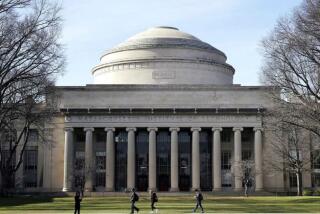China Reportedly Stole U.S. Nuclear Secrets in Mid-’80s
- Share via
NEW YORK — Using secrets stolen from a U.S. government laboratory, China developed the technology to miniaturize nuclear bombs, a key step toward fielding a modern nuclear arsenal, the New York Times reported today.
The technological advance was gained from the mid-1980s theft of U.S. nuclear secrets from the Los Alamos National Laboratory in New Mexico, according to administration officials.
The espionage was not detected until 1995, when American experts analyzing Chinese nuclear test results found similarities to America’s most advanced miniature warhead, the W-88, the Times reported.
In the past, China’s nuclear weapons designs were a generation behind those of the United States, largely because Beijing was unable to produce small warheads that could be launched from a single missile at multiple targets, a capability necessary for a modern nuclear force.
Within a year of the discovery of the theft, investigators had identified a suspect working at the Los Alamos laboratory, where the first atomic bomb was developed in the 1940s. The investigation also determined that China was continuing to steal nuclear weapons secrets from major American labs.
But some officials say the investigation was pushed aside for policy reasons.
“This conflicted with their China policy,” said a U.S. official, speaking on condition of anonymity. “It undercut the administration’s efforts to have a strategic partnership with the Chinese.”
No arrests have been made.
The White House was told of the nuclear espionage in the summer of 1997, just before a U.S.-Chinese summit.
The White House said it took the spying seriously by ordering improved security at the labs.
But a reconstruction by the Times shows that the government’s response to the nuclear theft was marked by delays, inaction and skepticism--even though some senior intelligence officials believed the theft was among the most damaging cases of espionage in recent history.
More to Read
Sign up for Essential California
The most important California stories and recommendations in your inbox every morning.
You may occasionally receive promotional content from the Los Angeles Times.










